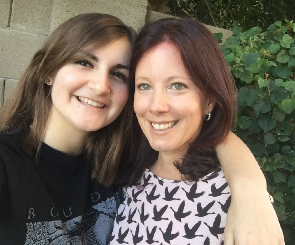
When Your Mom Doesn’t Fit the Jewish Mother Stereotype
In my mom’s words, the stereotypical “Jewish American Mother” is “a woman who tries to guilt everybody into eating everything, and for some unknown reason that no one can explain, she’s always worried that no one has enough to eat.” My mom’s early childhood consisted mostly of frozen TV dinners microwaved by her single mother of three, who’s teaching job mandated long hours. Her grandparents would bring Bronx-style Jewish food when they would visit—rugelach, gefilte fish, and pickled herring being among these delicacies. These traditional Ashkenazi meals were infrequent but enjoyed, and contributed to what little Jewish identity my mom held as a young girl (lox and bagels is still her all-time favorite meal). But she grew up in the suburbs of West Chester, Pennsylvania, (not New York City) and her immediate maternal influence didn’t conform to any traditional stereotypes. To my mom, Judaism meant (and still means) valuing education and pursuing excellence, not eating and fretting about others eating.
“I didn’t think much about being a Jewish mother when I had you,” she told me. “I just cared about being a good mother in the general sense.” And although undoubtedly sexist and unfair, to her, the role of motherhood carries with it societal pressures to do the household cooking and feeding, even if she doesn’t want to: “To be a good mother was to make sure my kids got fed and cared for,” my mom told me. “But I could feel an implication from other Jewish mothers that I didn’t do enough worrying, that I was a sub-par Jewish mother.”
Stereotypes, while they may come from a history of recognizable trends, are inherently harmful. Jokes about Jewish mothers are often relatable and hilarious, but let’s face it—it’s low-hanging fruit, just like jokes about craftily saving money, and the number of Rachels we all went to summer camp with. Seemingly harmless stereotypes commonly referenced within cultural communities, like the “Jewish American Mother,” can often be exclusionary, and erase the experiences of those who don’t fit the mold. Not all moms have the time or the desire to slave away in the kitchen, and there’s nothing wrong with that.
Mothers should be able to choose to spend their time in any way they wish—empowerment comes from choice, including the choice to make more traditional choices. But when these choices are taken away because of someone’s gender, and anything straying from traditional choices is deemed wrong, that’s a problem. There is no perfect maternal idol that should serve as the example to all mothers. Women should always have the right to make their own decisions, free from the confines of stereotypes, like these deeply ingrained as Jewish ones. My mother has taught me to make my own decisions, just as she has made hers. I’m grateful to have been raised by such an independent, badass woman (and I’m grateful for her Sunday night salmon, too).
This article was originally published on Jewish Women, Amplified, the blog of the Jewish Women’s Archive, and was written as part of the Rising Voices Fellowship.
The views and opinions expressed in this article are the author’s own and do not necessarily reflect those of Lilith Magazine.



